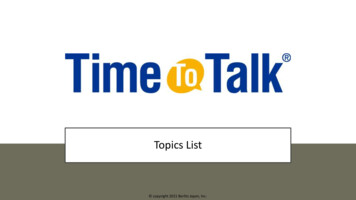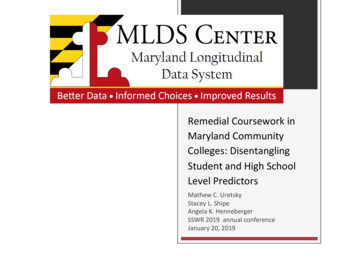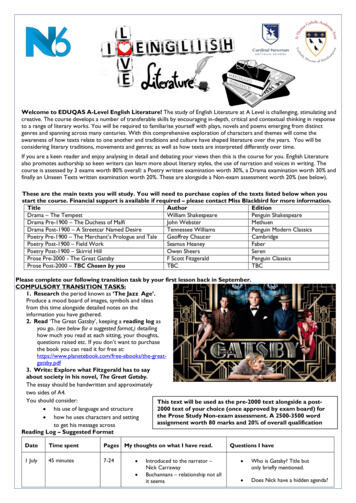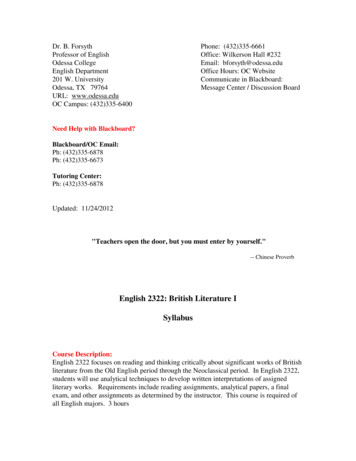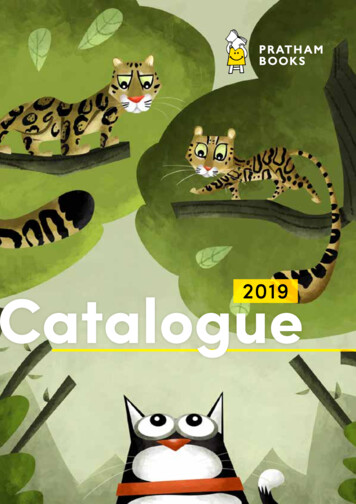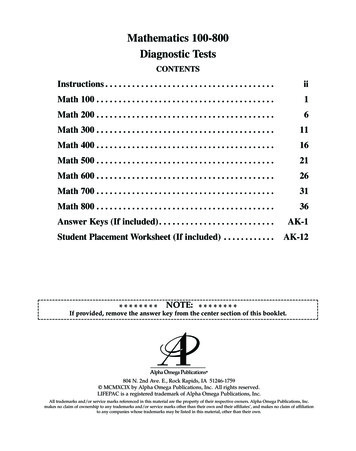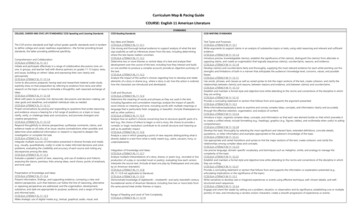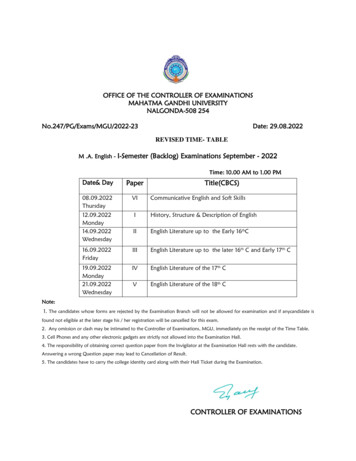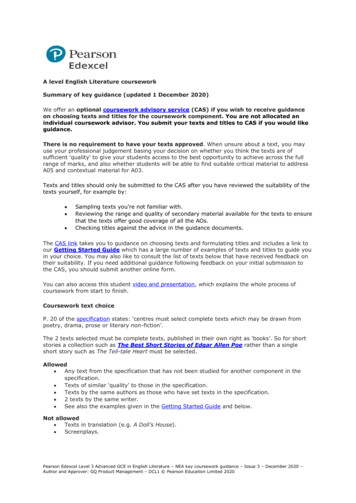
Transcription
A level English Literature courseworkSummary of key guidance (updated 1 December 2020)We offer an optional coursework advisory service (CAS) if you wish to receive guidanceon choosing texts and titles for the coursework component. You are not allocated anindividual coursework advisor. You submit your texts and titles to CAS if you would likeguidance.There is no requirement to have your texts approved. When unsure about a text, you mayuse your professional judgement basing your decision on whether you think the texts are ofsufficient 'quality' to give your students access to the best opportunity to achieve across the fullrange of marks, and also whether students will be able to find suitable critical material to addressA05 and contextual material for A03.Texts and titles should only be submitted to the CAS after you have reviewed the suitability of thetexts yourself, for example by: Sampling texts you’re not familiar with.Reviewing the range and quality of secondary material available for the texts to ensurethat the texts offer good coverage of all the AOs.Checking titles against the advice in the guidance documents.The CAS link takes you to guidance on choosing texts and formulating titles and includes a link toour Getting Started Guide which has a large number of examples of texts and titles to guide youin your choice. You may also like to consult the list of texts below that have received feedback ontheir suitability. If you need additional guidance following feedback on your initial submission tothe CAS, you should submit another online form.You can also access this student video and presentation, which explains the whole process ofcoursework from start to finish.Coursework text choiceP. 20 of the specification states: ‘centres must select complete texts which may be drawn frompoetry, drama, prose or literary non-fiction’.The 2 texts selected must be complete texts, published in their own right as ‘books’. So for shortstories a collection such as The Best Short Stories of Edgar Allen Poe rather than a singleshort story such as The Tell-tale Heart must be selected.Allowed Any text from the specification that has not been studied for another component in thespecification. Texts of similar ‘quality’ to those in the specification. Texts by the same authors as those who have set texts in the specification. 2 texts by the same writer. See also the examples given in the Getting Started Guide and below.Not allowed Texts in translation (e.g. A Doll’s House). Screenplays.Pearson Edexcel Level 3 Advanced GCE in English Literature – NEA key coursework guidance – Issue 3 – December 2020 –Author and Approver: GQ Product Management – DCL1 Pearson Education Limited 2020
Avoid Established GCSE texts* (e.g. To Kill a Mockingbird, The Strange Case of Dr Jekyll and MrHyde, Macbeth, or Romeo and Juliet), regardless of whether your students have studiedthem at GCSE. Children’s literature** (e.g. Alice in Wonderland). ‘Youth literature’ (e.g. The Hunger Games). ‘Populist texts’ for which there is unlikely to be suitable critical material (e.g. The Da VinciCode).*Texts commonly studied for GCSE (or KS3) should be avoided because of the potential ofnarrowing the curriculum, which could occur when a student studies a text more than once in their‘school career’. Other possible concerns are the availability of secondary materials pitched at KS3or KS4. It may be difficult for a student to judge whether secondary material is appropriate for Alevel study. In addition, texts which have been on GCSE specifications have been judged to besuitable for readers in the 14-16 age range. At A level, students have the opportunity to selecttexts which require a greater degree of maturity. The intention of A level coursework is also toallow students to pursue autonomous study and select texts which interest them individually. Alevel coursework can allow the study of texts from a more diverse range of writers than issupported by the requirements of the National Curriculum at KS4 and the subject criteria for GCSEEnglish Language and Literature.**Children's literature is, of course, studied at university. Undergraduates read a large number oftexts in an intense manner, allowing them to consider individual works of children’s literature in awider context of both other texts in the genre and other types of literature. At A level, studentsstudy a much narrower range of texts and it is potentially very challenging to write well onchildren’s literature and address all of the AOs.Other considerations:Poetry/short stories: students must select a published collection and their coursework mustconsider a reasonable number of poems/short stories. There are no numerical rules on howmany must be referred to in the coursework. This will depend on the length of the individual itemsand the focus of the coursework title. Students may not select the same collection of poemschosen for 9ET03 and write on ‘the rest’. If they wish to write on poetry for coursework, they needa different published collection of poems to that selected for 9ET03.Text pairing: We do not recommend comparing a collection of poetry with another collection ofpoetry, or short stories with short stories, for example, because of the complexity of movingbetween a very much multiplied number of texts when making comparative points in relation tothe coursework focus. If an anthology of poetry or short stories is selected, we would advise asingle whole text (such as a novel or a play) for the second text.Consider the two texts together with the title when making a judgement: a substantial, establishednovel exceeding 500 pages (such as Middlemarch) could be balanced by a ‘lighter’ choice suchas The Yellow Wallpaper.When a very recent text is selected, such as Hamnet by Maggie O’Farrell, it can be helpful to selecta more ‘established’ text to pair it with as it can be more difficult to find secondary material onnewer texts.This is a two-text component. Students should not select more than two primary texts tocompare. They should treat the texts roughly equally in terms of the word count given to eachtext.What makes a good coursework title?You are advised to adopt a title which encourages students to address all five assessmentobjectives. For example:'With reference to your wider critical reading around text A and text B, comparehow writer X and writer Y present Z.'Or:Pearson Edexcel Level 3 Advanced GCE in English Literature – NEA key coursework guidance – Issue 3 – December 2020 –Author and Approver: GQ Product Management – DCL1 Pearson Education Limited 2020
'Compare Z in text A and text B considering the contexts of their production andreception and the different ways in which these texts have been read’.You may like to review the suggested coursework titles in the Getting Started Guide, for manyexamples of appropriate texts and tasks. This coursework title checker allows you to work withstudents or colleagues to see whether proposed titles will allow students to address all the AOs.Some teachers and students also use a model with a quotation (often a critical view on a text),followed by a title which responds to the quotation. Where this model is chosen, it’s important toensure that the link between the quotation and rest of the title is clear, and that the whole titleworks grammatically.Coursework titles must include: The full titles of both texts and the names of their authors. A focus for the comparison-we advise using a single focus such as ‘the presentation ofpower’ rather than 2 or more concepts such as ‘religion and power’. The title should ideally‘flag’ AO2, for example through the use of the word ‘present’ to ensure the candidatedevotes sufficient attention to the analysis of the writers’ crafts.It is advisable to include: ‘Compare’ to flag AO4. A phrase referencing ‘wider reading around the texts’ and/or ‘the contexts of the texts’production and reception and the different ways in which these texts have been read’ inorder to flag AOs 3 and 5.Can my students all write on the same texts and the same title?Teachers must consider the range of ability and interest in their cohort, ensuring that students’interests and abilities are catered for, and that students have the opportunity to workindependently on their coursework. Students can be involved in formulating coursework titles andshould have some element of choice of texts/titles. So, it's fine for more than one class/student tostudy the same text/s, but a choice of tasks should be available.Many teachers offer a short list of text combinations such as:Heart of Darkness and Things Fall ApartBrick Lane and The Joy Luck ClubOryx and Crake and Year of the Flood (Margaret Atwood)Students will then generate possible titles, or choose from a shortlist of titles on each textcombination.Another successful approach is to teach one text to a class and offer a shortlist that studentschoose from for the second text and a choice of titles.What help can I give students? How many drafts should I mark? May I give studentsprovisional grades for their coursework drafts?There is guidance on these areas in the specification starting on page 23. Full ‘rules’ are in JCQ inthe documents listed for both students and teachers under Non Examination Assessments.Teachers generally mark one draft only of students’ work. They are permitted to provide generalfeedback. Teachers should not provide students with provisional grades, as grade boundaries areonly set after the exam session and as part of the awarding process.However, candidates must be told the mark given by their centre for a centre assessedcomponent/unit once their final work has been submitted. This requirement is to enable candidatesto request a review of the centre’s marking prior to the grades being submitted to the awardingbody, should they wish to do so. Please see the JCQ guidance.Are exemplars and training available?Yes, exemplars are available as part of the spring 2020 coursework marking trainingpack.Practicalities:LayoutPearson Edexcel Level 3 Advanced GCE in English Literature – NEA key coursework guidance – Issue 3 – December 2020 –Author and Approver: GQ Product Management – DCL1 Pearson Education Limited 2020
Students should select a font that is easy to read such as Arial or Times New Roman in at leastsize 12. It is customary for academic essays to use double-spacing as this allows for clearerannotation from teachersWord count (what’s included)Total for assessment: 2500–3000 words.The word count is advisory, but we do not recommend exceeding the upper word limit as studentswho significantly exceed the word count and whose work lacks coherence may achieve less well onAO1. There is no penalty for exceeding the word count. Students should note the number ofwords used at the end of their essay. The title, bibliography and footnotes (provided they containreferences and not ‘content’) are not included in the word count. Quotations are included in theword count.Bibliography/referencingSee p. 16 of the Getting Started Guide. Students need to consistently apply a recognisedreferencing system such as Harvard. They can, for example, use bracketed references in the bodyof the text to secondary material (Smith, p. 25) and provide full details of the text referred to inthe bibliography.When and how is the coursework submitted?All coursework in summer 2021 and thereafter will be submitted digitally through ournew portal. Please see this guidance which includes file-naming conventions, links to theauthentication sheets for each A level and a marker/moderator comments sheet. Thereis also a video guide.Each year, submission guidance is published. This covers all the practical details ofmoderating your cohort’s work and the administration involved in submitting yourcoursework sample. For May/June 2021, this can be found here.Private candidatesPrivate candidates may not submit coursework independently and Edexcel does not markprivate candidates’ coursework. For this reason, students planning to enter as privatecandidates are strongly advised to select the centre where they will sit their exams priorto commencing their A level studies. They should ensure that the selected centre has asuitably qualified teacher who can supervise the production of their coursework. Only ateacher at a registered Edexcel centre can set, supervise, mark and authenticatecoursework. They must be involved in setting the title and seeing enough of thestudent's work prior to submission of the final piece to be able to authenticate that thework has been produced by the student independently in accordance with therequirements of the specification and JCQ NEA regulations. The Head of Centre takesresponsibility for all marks submitted by their centre.Pearson Edexcel Level 3 Advanced GCE in English Literature – NEA key coursework guidance – Issue 3 – December 2020 –Author and Approver: GQ Product Management – DCL1 Pearson Education Limited 2020
A level English Literature 2015, coursework 9ET0/04, updated 21 December 2020Texts that have been submitted for feedback.This information is provided to give a sense of the texts that teachers have thought about using for 9ET0/04. Any feedback on thesuitability of a text is dependent on the text that it is paired with as well as the title proposed for the text combination. Inclusion on thelist does not equate to any judgement on a text in terms of the suitability of the content per se. Each teacher must consider whether atext’s content/themes/use of language is appropriate in their particular context.Suitable texts (includes any of thetexts on the 2015 specification notselected for another component; textsnamed as examples in the ‘GettingStarted Guide’; other works by thewriters named in the 2015 specificationor in this list; texts from the 2008 GCEEnglish Literature specification or bytheir authors, provided they are nottexts in translation)1984, George OrwellA Clockwork Orange, Anthony BurgessA Room of One’s Own, Virginia WoolfA Separate Peace, John KnowlesA Taste of Honey, Sheila DelaneyA Thousand Splendid Suns, KhaledHosseiniAda or Ardour: A Family Chronicle,Vladimir NabokovAmericanah, Chimamanda Ngozi AdichieAn Ideal Husband, Oscar WildeArmadale, Wilkie CollinsBehind the Scenes at the Museum, KateAtkinsonBirdsong, Sebastian FaulksTexts whose suitability maydepend on what they arepaired withTexts advised against (rationale:inadequate demand for A level; heavilyused at GCSE [re-use may narrow thecurriculum]; children’s literature;teen/young adult fiction; popular writingfor which AO3/AO5 is likely to be difficultto access and which may offer insufficientscope for AO2)Texts that are rubricinfringements (e.g.because not originallypublished in English);screenplays.A Lesson Before Dying, Ernest JGainesCracking India, Bapsi SidhwaFatherland, Robert HarrisFight Club, Chuck PalahniukGoldfinger, Ian FlemingGone Girl, Gillian FlynnHerbert West-Reanimator, H.P.LovecraftLeft Hand of Darkness, Ursula LeGuinLittle Women, Louisa May AlcottNo Country For Old Men, CormacMcCarthyOne Day, David NichollsA Game of Thrones, George RR MartinAlice in Wonderland, Lewis CarrollHarry Potter series, J K RowlingHow I Live Now, Meg RosoffI am Legend, Richard MathesonInterview with the Vampire, Anne RiceGirl Interrupted, Susanna KaysenMilkweed, Jerry SpinelliNoughts and Crosses, Malorie BlackmanPorphyria’s Lover, Robert Browning (nota ‘text’ for this rubric- a single poem)Stormbreaker, Anthony HorowitzThe Body, Stephen KingThe Boy in the Striped Pyjamas, JohnA Doll’s House, HenrikIbsenAll Quiet on the WesternFront, Erich MariaRemarqueCrime and Punishment,Fyodor DostoevskyCupid and Psyche andother tales from theGolden Ass, LuciusApuleius Madaurensis (orPlatonicus).Grimm’s Fairy Tales,Jacob and WilhelmGrimmPearson Edexcel Level 3 Advanced GCE in English Literature – NEA key coursework guidance – Issue 3 – December 2020 – Author and Approver: GQ Product Management – DCL1 PearsonEducation Limited 2020
Brick Lane, Monica AliCaptain Corelli’s Mandolin, Louis deBernièresCat on a Hot Tin Roof, TennesseeWilliamsCatch 22, Joseph HellerCloud Atlas, David MitchellCold Comfort Farm, Stella GibsonCollected works of Rochester, JohnWilmotDeath of a Naturalist, Seamus HeaneyDeath of a Salesman, Arthur MillerDigging to America, Anne TylerDisgrace, J.M. CoetzeeDispatches, Michael KerrDracula, Bram StokerEmma, Jane AustenEmpire of the Sun, J G BallardEvery Good Boy Deserves Favour, TomStoppardFeminine Gospels, Carol Ann DuffyFor Whom the Bell Tolls, ErnestHemingwayFoster, Claire KeeganHamlet, William ShakespeareHard Times, Charles DickensHawksmoor, Peter AckroydHeart of Darkness, Joseph ConradHigh Rise, JG BallardHold Your Own, Kate TempestHomage to Catalonia, George OrwellHow to be a Woman, Caitlin MoranI Know Why the Caged Bird Sings, MayaAngelouInto The Wild, Jon KrakauerInto Thin Air, Jon KrakauerJerusalem, Jez ButterworthKing Charles III, Mike BartlettKing Lear, William ShakespeareLife of Pi, Yann MartelPlaying in the Light, Zoe WicombThe Book Thief, Markus ZusakThe Crimson Petal and the White,Michael FaberThe Dice Man, Luke Rhinehart(George Cockcroft)The Fountainhead, Ayn RandThe Girl on the Train, PaulaHawkinsThe Help, Kathryn StockettThe Lord of the Rings, JRR TolkienThe Man in the High Castle, PhilipK. DickThe Revenant, Michael PunkeThe Secret Life of Bees, Sue MonkKiddThe Suspicions of Mr Whicher; orthe Murder at Road Hill House,Kate SummerscaleThe Time Traveler’s Wife, AudreyNiffeneggerWe Need To Talk About Kevin,Lionel ShriverThe Day of the Locust, NathanaelWestWe Have Always Lived in theCastle, Shirley JacksonThe Shock of the Fall, Nathan FilerThe Thirty-Nine Steps, JohnBuchanThe Reluctant Fundamentalist,Mohsin HamidGirl at War, Sara NovicThe Heart of the Sea, NathanielPhilbrickBoyneThe Bunker Diary, Kevin BrooksThe Fault in our Stars, John GreenThe Machine Stops, E. M. Forster (not a‘text’ for this rubric- not published as atext in its own right)The Powder Monkey, Paul DowswellThe Wolf of Wall Street, Jordan BelfortThe Wrath and the Dawn by Renee AhdiehThirteen Reasons Why, Jay AsherCode Name Verity, Elizabeth WeinEligible, Curtis SittenfeldHush, Hush, Becca FitzpatrickThe Princess Bride, William GoldmanThe Basketball Diaries, Jim CarrollForbidden, Tabitha SuzumaDiary of an Oxygen Thief, AnonymousRed Dragon, Thomas HarrisDo Androids Dream of Electric Sheep?Philip K. DickThe Green Mile, Stephen KingThe Lion, the Witch and the Wardrobe, C.S. LewisThe Northern Lights, Philip PullmanValley of the Dolls, Jacqueline SusannThe Martian, Andy WeirThe Hunger Games, Suzanne CollinsMetro 2033, DmitryGlukhovskyOvid’s Heroines, ClairePollardPerfume, PatrickSüsskindUtopia ,Thomas MoreThe Girl with the DragonTattoo, Stieg LarrsonBakkhai, Euripides,transl. Anne CarsonPearson Edexcel Level 3 Advanced GCE in English Literature – NEA key coursework guidance – Issue 3 – December 2020 – Author and Approver: GQ Product Management – DCL1 PearsonEducation Limited 2020
Light Shining in Buckinghamshire, CarylChurchillLolita, Vladimir NabokovLondon: The Biography, Peter AckroydMansfield Park, Jane AustenMean Time, Carol Ann DuffyMister Pip, Lloyd JonesNarrative of the Life of FrederickDouglass, Frederick DouglassNetherland, Joseph O’NeillNever Let Me Go, Kazuo IshiguroJude the Obscure, Thomas HardyNorthanger Abbey, Jane AustenOn The Road, Jack KerouacOnce in a House on Fire, AndreaAshworthOne Flew Over the Cukoo’s Nnest, KenKeseyOranges Aare Nnot the Oonly Fruit,Jeanette WintersonOthello, William ShakespearePoetry of the First World War, TimKendall (published anthology)Rabbit, Run, John UpdikeRebecca, Daphne du MaurierRed Dust Road, Jackie KayRegeneration, Pat BarkerRoom, Emma DonoghueRoxana, Daniel DefoeThe Handmaid's Tale, Margaret AtwoodScars Upon My Heart: Women’s Poetryand Verse of the First World War, Ed.Catherine ReillySelected Poems, Sylvia PlathSmall Island, Andrea LevySongs of Innocence and of Experience,William BlakeTess of the D’Ubervilles, Thomas HardyTexts written in English by ChinuaAchebe, Wole Soyinka, ChimamandaNgozi Adicihe and Nii Ayikqwi ParkesPearson Edexcel Level 3 Advanced GCE in English Literature – NEA key coursework guidance – Issue 3 – December 2020 – Author and Approver: GQ Product Management – DCL1 PearsonEducation Limited 2020
The Adoption Papers, Jackie KayThe Autobiography of Malcom X,Malcolm XThe Awakening, Kate ChopinThe Bell Jar, Sylvia PlathThe Bloody Chamber, Angela CarterThe Bluest Eye, Toni MorrisonThe Bone Clocks, David MitchellThe Castle of Otranto, Horace WalpoleThe Collector, John FowlesThe Color Purple, Alice WalkerThe Crucible, Arthur MillerThe Curious Incident of the Dog in theNight-Time, Mark Haddon (adult edition)The Danish Girl, David EbershoffThe Dark Room, Rachel SeiffertThe Duchess of Malfi, John WebsterThe Fixer, Bernard MalamudThe Glass Menagerie, Tennessee WilliamThe Go-Between, L P HartleyThe Great Gatsby, F Scott FitzgeraldThe History Boys, Alan BennettThe House Gun, Nadine GordimerThe Importance of Being Earnest, OscarWildeThe Joy Luck Club, Amy TanThe Killer Angels, Michael SharaThe Little Stranger, Sarah WatersThe Madness of King George, AlanBennettThe Monk, Matthew Gregory LewisThe Murders in the Rue Morgue andOther Tales, Edgar Allan PoeThe Mysteries of Udolpho, Ann RadcliffeThe Picture of Dorian Gray, Oscar WildeThe Price of Salt, Patricia HighsmithThe Remains of the Day, Kazuo IshiguroThe Road, Cormac McCarthyThe Stars My Destination, Alfred BesterThe Stories of Edgar Allan Poe(published collection)Pearson Edexcel Level 3 Advanced GCE in English Literature – NEA key coursework guidance – Issue 3 – December 2020 – Author and Approver: GQ Product Management – DCL1 PearsonEducation Limited 2020
The Township Plays, Athol FugardThe Virgin Suicides, Jeffrey EugenidesThe Vortex, Noel CowardThe Wasp Factory, Iain BanksThe Waste Land, T S ElliottThe World’s Wife, Carol Ann DuffyThe World’s Wife, Carol Ann DuffyThe Yellow Wallpaper, Charlotte PerkinsGillmanThings Fall Apart, Chinua AchebeThis Side of Paradise, F Scott FitzgeraldTitus Andronicus, William ShakespeareTitus Groan, Mervyn PeakTo The Lighthouse, Virginia WoolfTrainspotting, Irvine WelshTrue History of the Kelly Gang, PeterCareyUnion Street, Pat BarkerVernon God Little, DBC PierreWaiting for Godot, Samuel BeckettWe Are All Completely Beside Ourselves,Karen Joy FowlerWhite Teeth, Zadie SmithWide Sargasso Sea, Jean RhysWuthering Heights, Emily BrontePearson Edexcel Level 3 Advanced GCE in English Literature – NEA key coursework guidance – Issue 3 – December 2020 – Author and Approver: GQ Product Management – DCL1 PearsonEducation Limited 2020
Pearson Edexcel Level 3 Advanced GCE in English Literature - NEA key coursework guidance - Issue 3 - December 2020 - Author and Approver: GQ Product .

